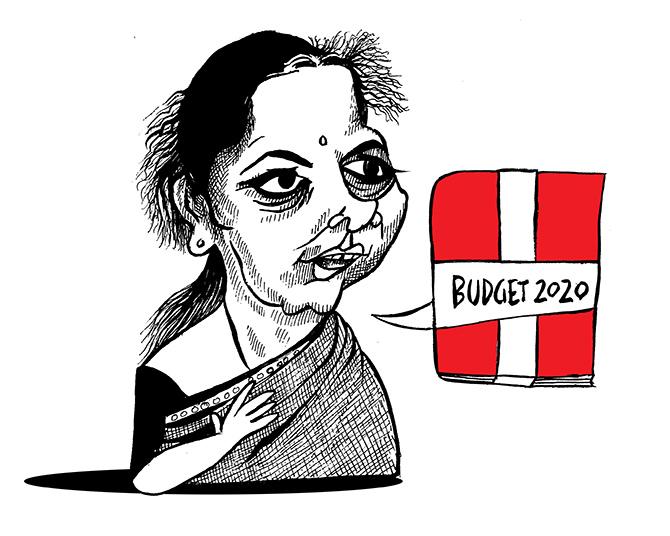'Even before the outbreak of the flu, it had become clear that the tax revenue numbers for 2019-2020 were overestimated,' observes A K Bhattacharya.

Among the many casualties of COVID-19, the rapidly spreading respiratory disease caused by coronavirus, there is one victim that seems to have escaped the attention of policymakers in India.
That victim is the Union Budget for 2020-2021.
Finance Minister Nirmala Sitharaman presented the Budget for 2020-2021 on February 1 when the impact of COVID-19 on the economy was not fully evident.
The first confirmed case in India was reported on January 30, even though by that time China had begun reporting confirmation of about 1,500 flu-afflicted cases per day.
But nobody in the world, let alone India, had by then raised any alarm over the possible spread of that disease across the world and its impact on global economic growth.
The earliest statement from the International Monetary Fund on its adverse impact on growth came only on February 22.
Not surprisingly, the Union Budget made no mention of either the disease or its impact on India's growth.
Instead, nominal growth of the Indian economy in 2020-2021 was projected at over 10 per cent, much higher than 7.45 per cent estimated for 2019-2020.
Gross tax revenues were projected to grow by 12 per cent and divestment receipts were to increase by a whopping 223 per cent, both of which, aided by tight control on expenditure, were expected to reduce the fiscal deficit for 2020-2021 to 3.5 per cent of gross domestic product, from 3.8 per cent in 2019-2020.
The Union Budget was passed by Parliament on March 23, without any changes in the overall numbers on revenue and expenditure.
Yet, nobody can dispute that the impact of COVID-19 will raise serious questions on the feasibility of achieving those numbers.
With the expectation of a financial package to help people and companies cope with the adverse impact of the flu on the economy, the fiscal deficit target set for next year will have to be relaxed significantly.
Even before the outbreak of the flu, it had become clear that the tax revenue numbers for 2019-2020 were overestimated.
The presumption was that in the last three months of 2019-2020, the government would be able to garner as much as 36 per cent of its gross tax collections for the full year, although the trend rate of collections during these three months in the previous two years was only 30 to 32 per cent.
Going by the government's statement in Parliament in early March, the gross tax collections at the end of February 2020 were estimated at Rs 17.4 trillion, implying that in March alone the government had to collect an additional Rs 4.2 trillion if it were to meet the revised estimate of Rs 21.6 trillion during the whole of 2019-2020.
Achieving that target itself would have been a difficult task.
But once the outbreak of COVID-19 became severe from the first week of March, the pace of economic activity even in India began slowing significantly.
The roll-out of the tax amnesty scheme, which was expected to get for the exchequer some additional revenues in the current year, could not be as smooth as was earlier expected.
Now that the last date of the scheme without penalty has been extended beyond March 31, whatever little was expected by way of additional revenues will materialise only next year.
Even the reduced divestment target of Rs 65,000 crore in 2019-2020 became elusive as the stock markets nosedived, recording a 38 per cent fall in six weeks.
The benefit from the increase in the excise duty and cess on petroleum products, announced in the wake of a sharp drop in international crude oil prices, would only be Rs 2,000 crore in the current financial year.
Thus, the revised estimate of the government's revenues during 2019-2020 will have to undergo a significant downward revision.
This will obviously put pressure on the government to achieve the revenue targets that it had set for 2020-2021.
And now with the adverse impact of COVID-19 on the pace of growth, the revenue numbers projected for next year would become more difficult to achieve.
If economic growth takes a hit next financial year, as is now being feared, what hope can anyone nurture of achieving a gross tax revenue growth target of 12 per cent?
Divestment goals also look very ambitious now.
Yes, the drop in the international crude oil price will help reduce the government's import bill and its subsidy expenditure on account of petroleum products and fertilisers.
But this will be more than offset by lower tax revenues from petroleum products.
With economic growth faltering, the consumption of petroleum products is expected to remain subdued.
Thus, even after the increase in excise duties, the net gain may not be enough to meet the 8 per cent growth envisaged in the collection of excise on petroleum products during 2020-2021.
What could the government have done under these circumstances when economic growth prospects are uncertain and the presumptions on the basis of which the Budget was framed have changed quite dramatically?
What's more, the government's expenditure burden is likely to see a huge increase if the legitimate demands on the exchequer are to be met to provide a stimulus package to revive the economy and address the health infrastructure needs without any further delay.
A major alteration in the overall numbers of the Budget, therefore, is almost inevitable.
For administrative reasons, it had perhaps become necessary to pass the Budget, before allowing the two Houses of Parliament to be adjourned sine die in view of the COVID-19 outbreak and the lockdown imposed in large parts of the country.
But public confidence in what the government intends to do in a crisis situation would have received a boost if the government had simultaneously announced a package of measures and given a broad outline of the consequent deviations in the Budget numbers.
This is also an occasion for the 15th Finance Commission, which is expected to submit its final report by the end of October, to deliberate on what kind of financial accommodation the Centre and the states need to plan for to meet the challenges of the health calamity that confronts the country.
COVID-19 will cause no less a disruption to the economy than the Goods and Services Tax has done.
The Finance Commission had been specifically asked to evaluate the impact of GST on government finances and make necessary recommendations.
The government should now ask the Finance Commission to examine what further steps need to be taken in view of the impact of coronavirus on the economy and government finances.













 © 2025
© 2025